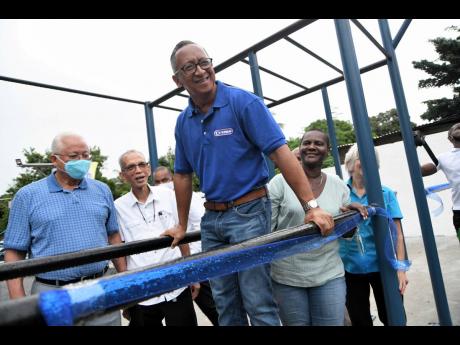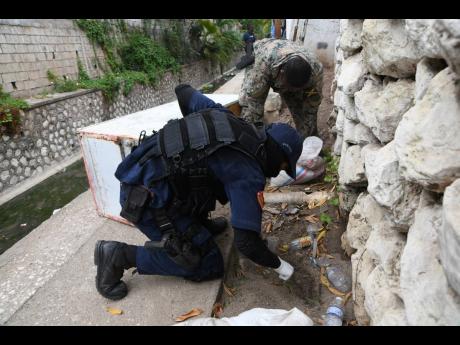How football and more scored for peace in Grants Pen
With around 30 people being killed violently in the 1990s over a one-month period in a community with more than 6,000 residents, Delroy Chuck is not shy that stakeholders for peace opted for pragmatism over philosophy.
The St Andrew North East member of parliament declares that it was an initiative by the Christian ministers’ fraternal and him to bring rival gangs face to face to resolve their disputes that ultimately led to relative peace in the once war-torn inner-city area.
In the wake of State Minister Homer Davis’ recent suggestion that the police and Government appease gangsters to end deadly conflicts, Chuck, who is Jamaica’s minister of justice, said the constituency for which he has been MP for more than 25 years once offered residents no freedom of movement.
According to Chuck, in 1996, Grants Pen was a community so plagued by crime that by five in the afternoon, the streets were like a ghost town, with residents fearful of becoming the victims of gang violence.
However, it was a long and painstaking process to bring the gangsters to the table - to discuss peace and the way forward.
It started with a football competition where all the areas that were in conflict played together. Chuck’s initiative received support from then Prime Minister P.J. Patterson and the kick-off was done by then Governor General Howard Cooke.
During the competition, Chuck said the teams would march around the community promoting peace.
He said that the community police management group played a pivotal role in ensuring that conflicts were peacefully resolved.
“The peace did not come easily. It has been sustained and we must not lose it. Anyone who thinks that they can come and control this community in any way with violence, we must expose them,” Chuck declared while speaking at Sunday’s official opening of exercise bars at the Grants Pen Peace Park. The facility, which is sponsored by Cremo, is part of efforts to continue peace initiatives in the community.
“I go into the community and let them know that if you know anyone with guns, let me know. If you know anyone who wants to cause any flare-up of violence, let me know,” he said.
Chuck praised several stakeholders who work together in Grants Pen for peace.
The Reverend Ian Muirhead, who has been instrumental for more than two decades in bringing about a dramatic shift from the violence-plagued community to one that now enjoys relative calm, said that the Church and the MP brought the warring factions together, triggering the dawning of a new day.
The pastor recalled that he and Chuck brought the gangsters to meet in his Upper Room church to thrash out disputes.
“I hear them talking about negotiating with gangs. We didn’t negotiate with them. What we did was that we brought the gangs together and try and find out what was the problem and encourage them to settle their differences,” he said.
However, critics of dealmaking with criminals have argued that those agreements are not binding over prolonged periods. And that the guns remain in hibernation, only to bark again later.
Just two months ago, three men, including an area don, were murdered on Morgan Lane in Grants Pen.
And August Town has suffered deadly gang conflicts since its own 2008 pact between gangsters and is currently one of seven zones of special operations with concentrated focus by the security forces.
Milton Tomlinson, mediation and intervention specialist, stressed that negotiation and intervention with gangsters should be left out of the hands of the police.
He insists that the conflict-resolution response should come from the Peace Management Initiative (PMI), whose objective is to set up an early warning and intervention mechanism to detect and manage potentially explosive, criminal, or violent situations.
“The Peace Management Initiative is an experienced organisation with the know-how to help and stem what is happening in our communities today,” Tomlinson explained.
“That [negotiating with criminals] is one of the method of the Peace Management Initiative and why is it that they are seeing it so necessary and needed but yet not really putting it on Government to really fund the Peace Management [Initiative] in the way it should be funded and managed,” he added.
That appeared to reference National Security Minister Dr Horace Chang’s insistence that so-called violence interruptors have not been successful in halting gang violence. Chang, who said last Thursday that he did not agree with Davis’ appeasement proposal, has charged that much of the investment in social intervention has gone down the drain.
A 2021 Caribbean Policy Research Institute report has also suggested that there is no empirical evidence to suggest that social intervention programmes have had a significant impact in suppressing violence.
But Tomlinson is urging the Government to re-engage the PMI, who are more likely to effect change than the deployment of soldiers who “hitch up under tree corners or stuff like that” and tend to lose respect and authority.
“These guys in the communities, they are not aliens. They are Jamaicans, they are citizens. They born and grow in the communities,” he said.
“They attend the same schools in the communities, so engaging them would help to solve the problem, but that’s not the job of the police or law enforcers.”


